09.01.2025
On November 15, 2024, Adrian Avellaneda Vergara earned 3rd Prize for Best Poster at the iDiv Conference
This award celebrates Adrian’s exceptional work in fostering meaningful connections between people and nature, advancing public understanding and support for insect conservation. Adrian spearheaded a collaboration with the ecotourism company Rainforest Expeditions and local Peruvian communities, co-developing this impactful project as part of his Master’s thesis. The jury commended Adrian’s scientific poster for its outstanding scientific communication. His poster achieved the balance of conveying complex scientific information in an engaging and accessible way for public audiences.
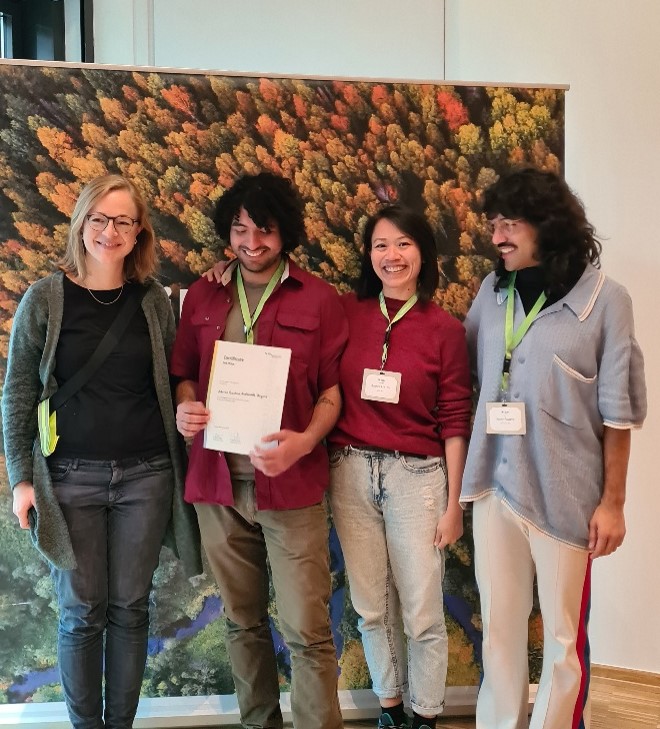
09.01.2025
On September 11, 2024, Dr. Rachel Oh received the prestigious Gfö Prize at the Ecological Society of Germany, Austria, and Switzerland conference
Awarded biennially, this honor recognizes exceptional early-career ecologists for advancing ecological research. Rachel was celebrated for her outstanding contribution on designing future-resilient landscapes that enhances biodiversity conservation and human health outcomes, addressing global challenges. The jury commended Rachel for her exceptional scientific contributions, including her research agenda, and record of publications and collaborations, excellent in science communication and her commitment to mentoring the next generation of researchers.
10.12.2024
On 9 October 2024, Julia von Gönner was awarded the "Wissen der Vielen" research prize for citizen science
The award recognises her work in the project "FLOW: Exploring streams - creating knowledge together", which is carried out in cooperation with environmental and angling associations, schools and numerous committed citizens' groups throughout Germany. The prize honours her publication "Citizen science shows that small agricultural streams in Germany are in a poor ecological status". According to the jury, the project's innovative approach and involvement of different stakeholders has made a significant contribution to improving our knowledge of watercourses. Project coordinator Julia von Gönner and the FLOW team will receive a prize of €20,000.
.jpg)
research prize Citizen Science ©Claudia Höhne
13.6.2023
Scientists support the EU’s Green Deal and reject the unjustified argumentation against the Sustainable Use Regulation and the Nature Restoration Law
The scientific community is deeply concerned about the ongoing discussions on the EU’s Green Deal. Of particular concern are the current criticisms targeting the Sustainable Use Regulation (SUR) and Nature Restoration Law (NRL). We urge policy makers to continue the legislative procedure for the SUR and the NRL, and invite opponents of the Green Deal for a consultation with scientists.
The call was led by 17 scientists and signed by 3,339 scientists across EU Member States and 17 additional countries.
Read our statement here:
English // Czech // Dutch // Finnish // French // German // Hungarian // Polish // Slovak // Spanish
09.03.2021
Dr. FOREST – diversity of forests affecting human health and well-being: Video Release
Click here for the youtube video
Hot off the press, the Dr. FOREST video which has been released during the annual Dr. FOREST meeting that took place from 1st-3rd March. ESS researchers Kevin Rozario, Rachel Oh and Prof Aletta Bonn together with former lab member Dr Melissa Marselle and the neuroscientists Prof Erich Schröger, Dr Dagmar Müller and Dr Urte Roeber from Leipzig University contribute by investigating the impact of visual and acoustic forest diversity, as well as forest walks on mental health and well-being.
26.01.2021
Street trees close to the home may reduce the risk of depression
Researchers show positive effect of urban nature on mental health
Click here for the video at "Sachsen Fernsehen"
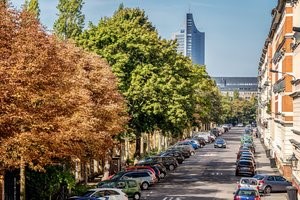 High density of street trees in cities (like here in Leipzig City centre) may help to improve mental health as well as local climate, air quality and species richness. (Picture: Philipp Kirschner)
High density of street trees in cities (like here in Leipzig City centre) may help to improve mental health as well as local climate, air quality and species richness. (Picture: Philipp Kirschner)
"Leipzig. Daily contact with trees in the street may significantly reduce the risk of depression and the need for antidepressants. This is the result of a study by researchers at the Helmholtz Centre for Environmental Research (UFZ), the German Centre for Integrative Biodiversity Research (iDiv), Leipzig University (UL), and the Friedrich Schiller University Jena (FSU), recently published in the journal Scientific Reports. Street tree planting in residential areas of cities can serve as a nature-based solution to reduce the risk of depression with added benefits of also addressing climate change and biodiversity loss. This should be taken into account by urban planners, health professionals, and conservationists."
Media Release on the 25th of January 2021 by Sebastian Tilch, Media and Communication at iDiv, German Centre for Integrative Biodiversity Research (iDiv) Halle-Jena-Leipzig)
11.09.2020
Dr. FOREST fieldwork
During the fieldwork at the forests of Hainich, Thuringia, Germany, the TREEWEB sites situated between Bruxelles and Ghent in Belgium and the Białowieża forest in Poland photos of preselected forest patches were taken with the intention to capture varying forest biodiversity gradients as part of the Dr. FOREST project, investigating the effect of forest biodiversity on health and well-being.
09.09.2020
A milestone for book edited by ESS scientists Dr Marselle and Prof Bonn!
The open-access book "Biodiversity and Health in the Face of Climate Change" has been download almost 285 000 times -- and was among the top 25% most downloaded Springer 'Earth and Environmental Sciences' ebooks in 2019. You too can read the book here.
05.09.2020
How are our insects?
Susanne Hecker, Volker Grescho and Rebekka Sontowski from the Citizen Science project InsektenMobil (UFZ/iDiv) show innovative methods of insect research in the MDR documentary.
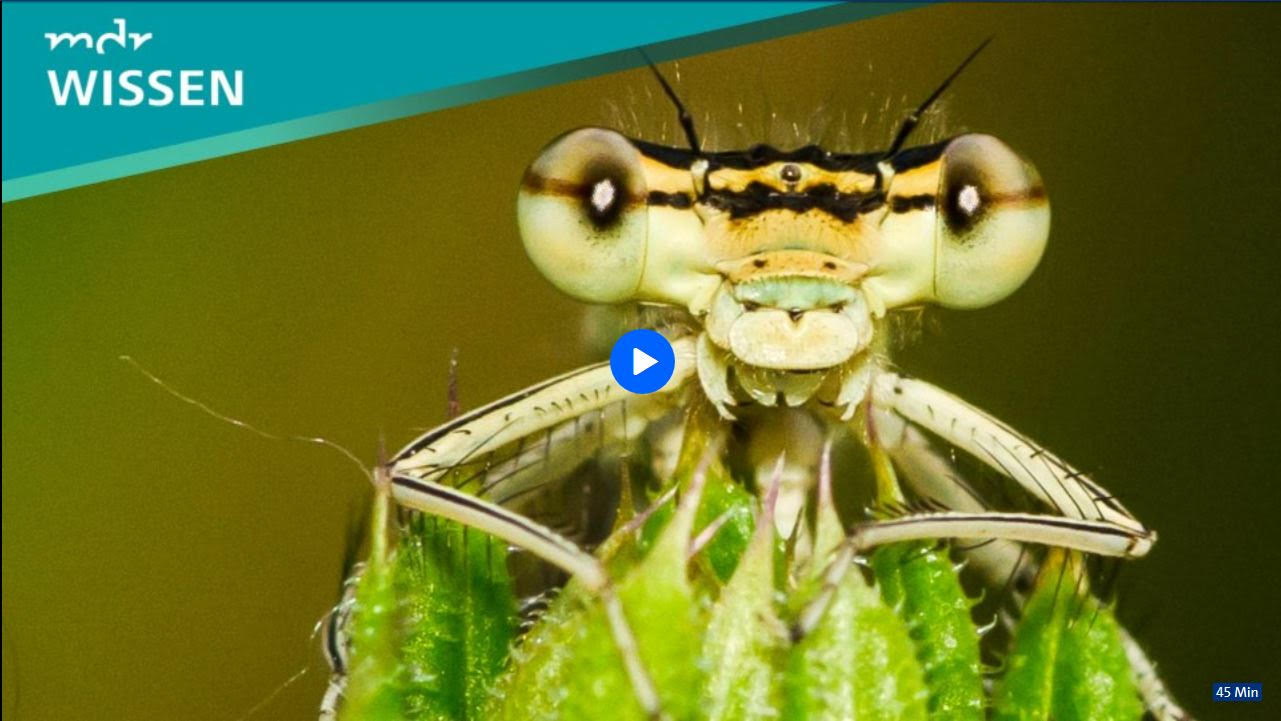
03.09.2020
VielFalterGarten
Project Website: http://www.vielfaltergarten.de
Many native butterfly species are threatened in their existence. Data of the German Butterfly Monitoring (TMD) show a negative trend in population development for 25 of 69 evaluated butterfly species in Germany in the period 2006-2018 (TMD 2019). Counteracting the loss of butterfly diversity is the goal of the project "VielFalterGarten", for which the three project partners - the Helmholtz Centre for Environmental Research - UFZ, BUND Leipzig and the City of Leipzig - are jointly focusing on cooperation between science, citizens and the City of Leipzig.
So-called Citizen scientists receive comprehensive information about the appearance, diversity and ecology of native butterfly species within the project. With this knowledge they can actively participate in the observation and creation of butterfly habitats in urban areas and pass on their knowledge to others. Together with the city administration and the public, long-term activities for the protection of butterflies in Leipzig are to be initiated. The project should demonstrate that a specifically promoted exchange of knowledge between researchers and the participants in the society promotes added value for all participating groups and nature.
"VielFalterGarten" is a communication and education project that aims to show how a biodiversity-promoting development of urban spaces for butterflies can succeed. The project pursues four main areas of action:
- Education: The knowledge about butterflies and nature conservation-friendly design and management of public green spaces and private gardens should be promoted. Citizens should be enabled to get to know butterflies through regular observations and to carry out conservation measures themselves. The aim is to encourage them to discuss the promotion of biodiversity, butterfly protection and adaptation to climate change, to question and change their views on conventional gardening, and to motivate them to act in their immediate environment.
- Butterfly protection: butterflies are to be promoted by the targeted application of forage plants and nectar sources, the creation of flower strips and, for example, changed mowing regimes in private and public green spaces in Leipzig.
- Citizen Science: Citizens are to participate in monitoring the measures, which should lead to an understanding of butterfly ecology and a willingness to make independent contributions to nature conservation.
- Network formation: Through the targeted networking of different actors in the urban area, sustainable cooperations are created in order to establish the model project in Leipzig in the long term and become a model for other cities.
01.09.2020
Awareness raising alone is not enough
Nature conservation policy too rarely succeeds in changing people's behaviour
It is a well-known problem: too rarely do nature conservation initiatives, recommendations or strategies announced by politicians lead to people really changing their everyday behaviour. A German-Israeli research team led by the Helmholtz Centre for Environmental Research (UFZ) and the German Centre for Integrative Biodiversity Research (iDiv) has investigated the reasons for this. According to the team, the measures proposed by politicians do not sufficiently exploit the range of possible behavioural interventions and too rarely specify the actual target groups, they write in the journal Conservation Biology.
01.09.2020
Citizen Science survey of the butterfly Apharitis cilissa in 2020
An article in the newspaper HaAretz (“The Land”) describing the results of the Citizen Science survey of the butterfly Apharitis cilissa in 2020, which shows that its largest population in the Israeli Coastal Plain declined in 99.7% over 2006-2020 has been published. Article in Hebrew: https://www.haaretz.co.il/nature/.premium-MAGAZINE-1.9102147The research has also been picked up in an interview by a radio station, in a popular science program (minute 00:22:40): https://omny.fm/shows/three-who-know-2/31-8-2020
06.05.2020
Citizens create knowledge: "2020 is a good time" - in discussion with the White Paper Working Group
Link to the article by Florence Mühlenbein (in German)
"It is about promoting new ways and the transformation potential for innovative cooperation between social actors and science" -- Bürger schaffen Wissen has spoken with Prof. Aletta Bonn and Susanne Hecker as members of the steering committee of the AG Weißbuch about the further development of the Green Paper Citizen Science into a White Paper.
30.09.2019
Exploring the links between biodiversity and human health
Preventable, non-communicable disease, such as mental illness, obesity and cardiovascular disease, account for 77% of the total disease burden in Europe and significantly drive up the cost of health care. Increases in non-communicable diseases, and biodiversity loss are among the greatest global challenges modern society is facing today. While biodiversity forms our central human life-support system on our globe, human activities are also responsible for the accelerating loss of biodiversity. In order to improve both our health and to protect our environment, we need to better understand how biodiversity matters for human health and well-being.
Increasingly, science is starting to unravel how biodiversity impacts on human health and well-being. From this research, we start to understand the different mechanisms and what doses of biodiversity may be needed to improve our health. Many different disciplines need to be involved to understand the ‘big picture’ of how biodiversity influences our health. Often, however, information from one scientific field is not shared with those from another scientific field.
What is needed is to break down this silo-thinking and to organise and synthesise the existing knowledge in a way that helps reveal the ‘big picture’. In the beautiful scenery of Schloß Herrenhausen in Hannover, 28 European experts from public health, medicine, psychology, ecology and geography, will meet in a workshop, organised by Dr Melissa Marselle and Prof Aletta Bonn, to discuss a framework describing the various ways by which biodiversity influences human health and physical, mental and spiritual well-being.
A biodiversity and health framework is required to aid action by both public health professionals and nature conservation experts. This framework can aid the development of natural ‘health treatments’ in which biodiverse environments are used to reduce stress, depression or encourage physical activity. Management of biodiversity could therefore form a globally important (natural) health service.
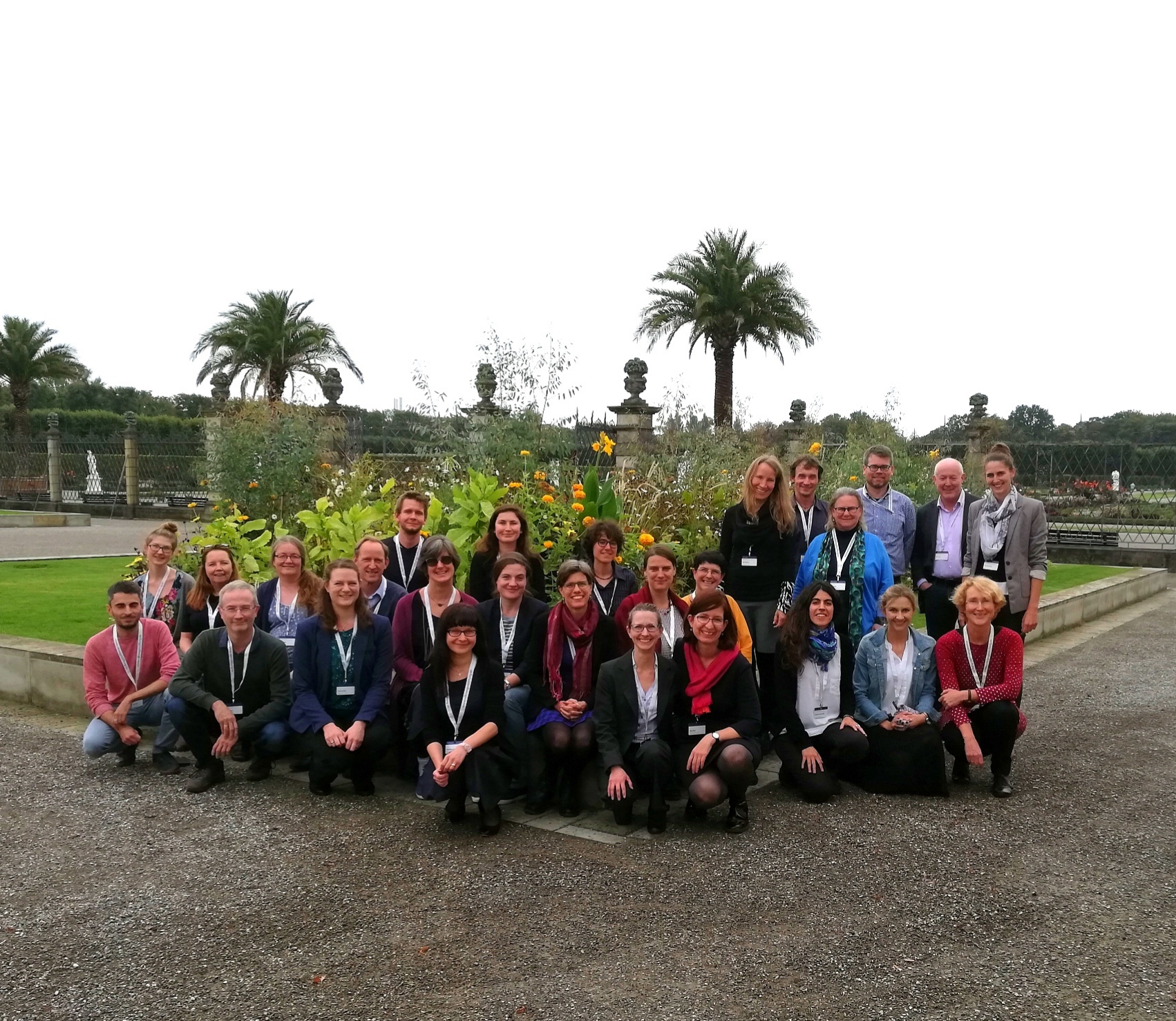 Symposium "Exploring pathways linking biodiversity to human health and well-being" 25th – 27th of September 2019.
Symposium "Exploring pathways linking biodiversity to human health and well-being" 25th – 27th of September 2019.
15.07..2019
Lab Retreat Bavarian National Park
In June we went on our annual lab retreat to the Bavarian Forest National Park. The NP Bavarian Forest, established in 1965, is a mixed mountain forest, the largest protected forest area in central Europe, known for its strict ecological process-focussed conservation policy (“let nature be nature”) and interesting biodiversity development after a large bark beetle outbreak in 1983/84 and also subsequent years. PD Dr Marco Heurich welcomed us with a guided tour of the NP research sites (https://www.nationalpark-bayerischer-wald.bayern.de/forschung/projekte/index.htm), that e.g. evaluate the population dynamics and impact of the bark beetle and regeneration of natural vegetation, forest carbon dynamics, lynx monitoring as well as natural carcass decomposition dynamics. Besides the wonderful nature impressions, the main focus of the retreat was on team building and collaboration to bring in everybody’s expertise and knowledge in ongoing and upcoming research projects and in furthering new ideas. The fun and concentrated balance needed to walk on a slackline also inspired us to develop new ideas and develop our team projects.
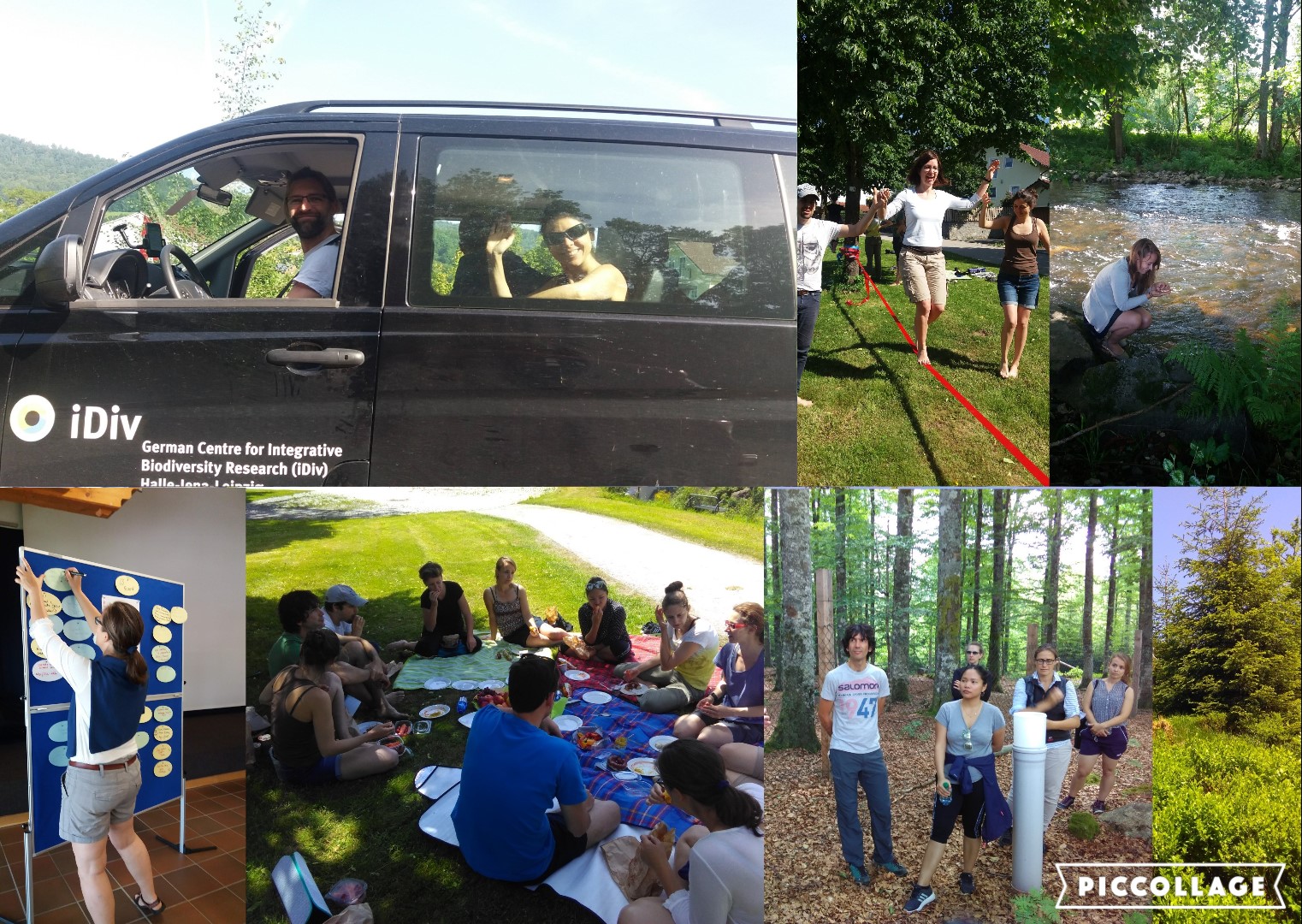
30.08..2018
My voluntary ecological year for ecosystem research
My voluntary ecological year for ecosystem research
My name is Sophia Padelat, since September 2017 I am running a Voluntary Ecological Year at the UFZ-Department Ecosystem Services (ESS). The Department's tasks include the scientifically sound recording, evaluation and better understanding of the state of ecosystems and their benefits for mankind.
.jpg) Sophia Padelat
Sophia Padelat
That the scientific work of the department is up-to-date is also shown by the nationwide political activities on insect extinction, which is on everyone's lips. This year's coalition agreement between the CDU, CSU and SPD, for example, states that one of the political tasks is to combat insect extinction. So it is time for action.
Insects are part of ecosystems, for example as pollinators they are important natural service providers. The Department ESS uses participatory methods to record biological diversity. This includes research with people, also known as Citizen Science. At the UFZ the Tagfalter Monitoring Deutschland (TMD) was initiated, which is supported by volunteers.
My FÖJ at the UFZ gives me insights into this voluntary research project and the scientific research of Citizen Science topics. Only recently I took part in the TMD workshop. I got to know the course of such a workshop and learned for example more about butterfly protection, the influence of climate change and the endangerment of butterflies. Of course, insect mortality was also an issue, because various butterfly species are threatened or are probably already extinct.
With the beginning of the warmer temperatures the transect censuses start in Germany and I can also support the work on a transect in Leipzig. This gives me the opportunity to get to know research in the field of ecosystem services in practice. I am looking forward to working in the "field" and I look forward to what awaits me in the second half of my voluntary year.
I would like to thank my UFZ colleagues Elisabeth Kühn (Department of Biocenosis Research) and Prof. Dr. Andreas Zehnsdorf (Department of Environmental and Biotechnology Centre) for the opportunity to participate in TMD, and my mentors Dr. Anett Richter and Prof. Aletta Bonn (Department of Ecosystem Services).
Sophia Padelat, FÖJlerin at the UFZ
31.05..2018
Parliamentary evening on insect decline
On 19 April, the Landesvertretung of Mecklenburg Vorpommern hosted a federal parliamentary evening for members of parliament in Berlin and invited guests from agencies and NGOs. Environment minister Svenja Schulze gave a keynote and joined a podium discussion with experts from policy and science, among them Till Backhaus, Mecklenburg Vorpommern environment minister, Fritz Vahrenholt, CEO Wildtierstiftung, Prof. Teja Tscharntke, University of Göttingen, and Aletta Bonn.
There was a clear call for a change in agricultural practice and to act now, as well as to change European funding streams through the Common Agricultural Policy. Actions need to be accompanied by research into cause-effect relationships and a German-wide insect monitoring, and UFZ and iDiv can contribute their expertise towards this. The suggestion to involve experts from natural history societies and to strengthen citizen science in the insect monitoring programme was welcomed by the minister
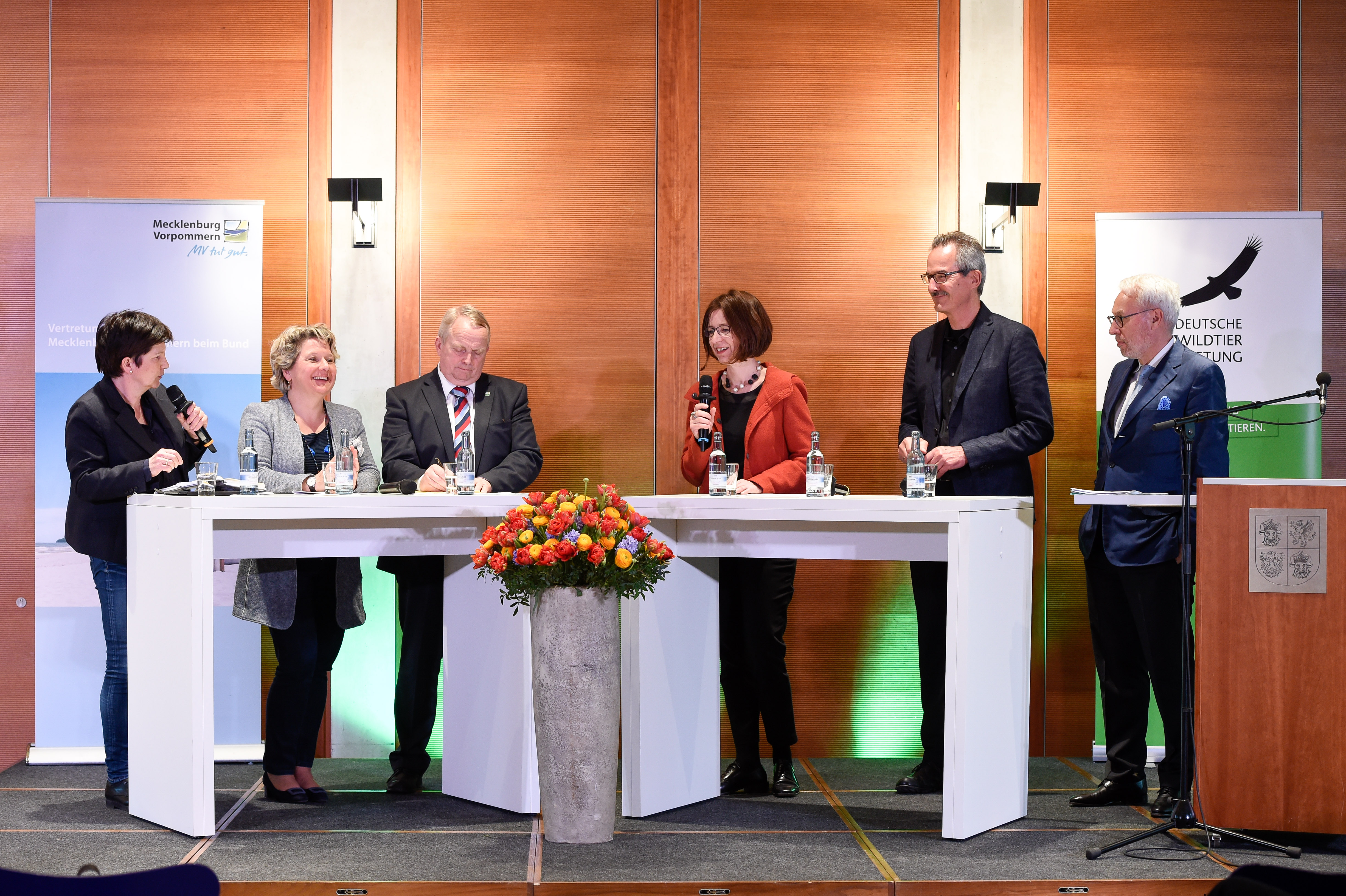
14.05.2018
iDiv Internship Summary of Liyana Nayan
During my semester break, I participated in a five-week long internship with the Ecosystem Services research group at iDiv. I had the opportunity to work with Dr Emilie Crouzat in the H2020 ECOPOTENTIAL project, assessing the cultural ecosystem services (CES) over three national parks in Europe; the Swiss National Park, the Austrian Kalkalpen National Park, and the Peneda-Gerês National Park in Portugal. My main responsibility was to design a survey that will be used in the parks over the course of summer 2018. The main objectives of the survey are to discover the CES enjoyed by the park visitors and how the parks’ biophysical indicators contribute to the visitors’ experience. The data that we collected would then ensure complementarity with the information gathered from focus group meetings and geophysical modelling. The tangible data would also enable us to observe the gaps between CES demand and supply and assess different kinds of opportunity for CES in the national parks. Working with the ESS team on an on-going, large-scale project has enabled me to grow professionally and academically and I cherish my experience working with the team!
Liyana Nayan
Msc Ecosystem Services
TU Dresden-IHI Zittau
23.04.2018
Workshops to assess ecosystem services in mountain protected areas
In the context of the Ecopotential project , the ESS team (Aletta Bonn, Andrea Büermann, Volker Grescho and Emilie Crouzat) organized in March and April 2018 three workshops to assess ecosystem services in mountain protected areas. Each workshop targeted one of the national parks studied by the ESS team in collaboration with the local park managers and scientific partners: the Swiss National Park, the Austrian Northern Limestone National Park, and the Portuguese Peneda-Geres National Park. For each park and its surroundings, participants with diverse backgrounds (park managers, tourism, conservation, forestry …) collectively identified hotspots for cultural ecosystem services and discussed their main drivers and trends. The workshops were also the opportunity to prepare the upcoming field work of summer 2018, when the visitors’ perceptions and uses of cultural ecosystem services in the three national parks will be collected.
15.01.2018
Aletta Bonn on landscape restoration
In this 3-minute video by Cambridge Conservation Initiative, Aletta Bonn, Head of Ecosystem Services, Helmholtz-Center for Environmental Research – UFZ, talks about the importance, challenges and good practice in landscape restoration.
“Restoration is a key principle to bring Natural Capital back into landscapes. We should see restoration as an investment into our future and into the future of our children”. Click on the picture to get to the video.
Aletta Bonn on landscape restoration (YouTube)
20.01.2018
Focus group meeting at Natural Heritage Sites in Germany (Nationales Naturerbe)
In mid-January, two focus group discussions on historical ecosystem services on natural heritage sites were held in Wahner Heide and Stegskopf. Participants from nature conservation, forestry, agriculture, from local historical societies, and administration came together. During the discussions they exchanged on the cultural and environmental history of the natural heritage sites. Various ecosystem services were discussed interactively by means of maps and posters.
The events are part of the feasibility study “Historical ecosystem services on natural heritage sites in Germany”, which is funded by the DBU and carried out in cooperation with Friedrich-Schiller-University Jena, Bund Heimat und Umwelt in Deutschland (BHU) and Wissenschaftliches Büro Leipzig.
The 1-year feasibility study serves to assess historical land-use requirements in cultural landscapes of high natural and cultural value. We develop and test methods to support the combination of historical cultural needs and nature conservation requirements on three selected natural heritage sites.
More information at:
https://naturerbe-leben.de/en/home-2/
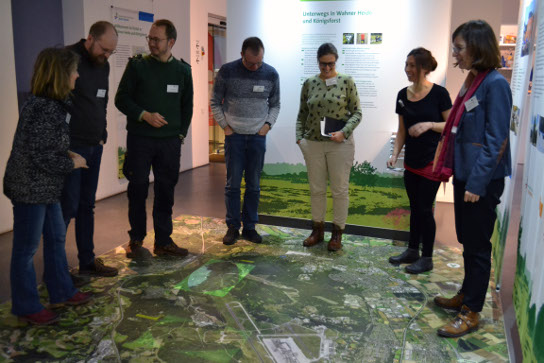 Focus group meeting in the Wahner Heide near Cologne
Focus group meeting in the Wahner Heide near Cologne
28.11.2017
Citizen Science at the German Embassy in Delhi (India)
New Delhi. On November 7, a German-Indian symposium on science communication entitled “Bringing Science to people” took place in New Delhi. UFZ/iDiv scientist Anett Richter presented concepts and best-practice examples from her work in the field of citizen science. The event also included a visit to the Indian University of Punjab, which was made possible with the support of the Humboldt Fellows Network.
Further information can be found here: News der Deutschen Botschaft in Delhi (Indien)
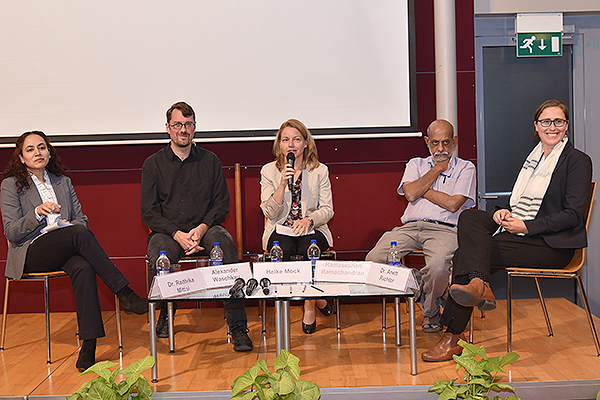
30.10.2017
“We need you”: UN climate chief to Potsdam climate scientists
10/13/2017 - Hundreds of millions of people will be affected by climate change impacts and their implications for health or migration already within the next few decades, sectors that so far often get overlooked in this context. This is one of the insights of the Impacts World Conference organised by the Potsdam Institute for Climate Impact Research (PIK) in Germany this week. About 500 scientists from 67 countries were gathering at the conference with the title “Counting the true costs of climate change” to push climate impact research to the next level by better integrating socio-economic factors. At the same time, the institute celebrated its 25th anniversary hosting this meeting of the global impacts research community, in the spirit of its mission followed for a quarter century: further advancing scientific progress and communicating insights to stakeholders.
Further Information / Source:
PIK Potsdam - Press releases
.jpg)
30.10.2017
Expert workshop on the development of a guideline on historical ecosystem services on natural heritage sites
From September 5 - 6, 2017, the expert workshop for the development of a guideline on historical ecosystem services on natural heritage sites took place at Burg Wissem near the DBU natural heritage site “Wahner Heide”.
The workshop was organized as part of the project “Historic ecosystem services on natural heritage sites”. This is a one-year feasibility study to investigate historical utilization claims of cultural landscapes with high nature conservation and cultural-historical value. Methods are being developed and tested on selected natural heritage sites to show how the needs of nature conservation and cultural heritage protection can be combined in these areas. The concept of ecosystem services (ESS) will be used and further developed as part of the project.
The aim of the workshop was to bring together experts from the fields of historical development of ecosystem services (cultural and natural landscapes) and to jointly advance the creation of an overview of methods for the conception of a guideline for recording the historical development of DBU natural heritage areas.
Further information can be found here:
www.naturerbe-leben.de
22.05.2017
New article on MDR for Biodiversity Day: Citizen science - it wouldn't work without recreational researchers
“Without citizen science, or citizen research, we would hardly know exactly how our biodiversity is doing. No scientific institution could do what the ten million or so volunteers observe and document in their free time. But what drives us to count birds and identify beetles in the first place?” Our employee Dr. Anett Richter answered this question for Mitteldeutscher Rundfunk. The article can be found here:
Citizen Science - ohne Freizeitforscher geht es nicht (MDR Wissen)
Source: MDR
15.12.2016
European network for Citizen Science established
The remarkable growth of citizen science in Europe demands actions to bundle capacities for citizen science. With the funding of the European Cooperation in Science and Technology Funding Scheme (COST Action CA15212),researchers from all sciences and scholars from 32 European countries will investigate and extend the impact of the scientific, educational, policy, and civic outcomes of citizen science and gauge the potential of citizen science as enabler of social innovation and socio-ecological transition. At the Kick Off event of the COST Action, held from 12.-13.12.2016 in Berlin, Susanne Hecker and Dr. Anett Richter (both Department Ecosystem Services) contributed to the working groups “Science Policy” and “Data Quality” with their expertise about science communication and the strategic development of citizen science at the national level. The relevance of high data quality achieved through citizen science and the challenges such as uncertainties in observations, the lack of evaluation criteria as well as the barriers to inform decision makers were intensively discussed and will be further addressed in reports and scientific publications. At the event reception at the Natural History Museum Berlin, Susanne and Anett, presented the Living Atlas of Nature Germany. The arranged infographic opened the discussions about the mutual benefits of such biodiversity atlases and was well received. Anett Richter
Further information:
http://www.cost.eu/COST_Actions/ca/CA15212?
25.11.2016
sTeleBES - Telecoupled use of biodiversity and ecosystem services: synthesis of concepts, methods and evidence
28.11.-02.12.2016
PI: Matthias Schröter; Thomas Koellner, Aletta Bonn
The Department of Ecosystem Services (UFZ/ iDiv) is leading the sTeleBES sDiv working group on Telecoupled use of Biodiversity and Ecosystems Services. Ecosystem providing ecosystem services are often located far away from areas where people live and benefit from these services. Such inter-regional flows of ecosystem services can be induced by both human activities and environmental flows. Through use of such ecosystem services, countries can impact on biodiversity and the capacity to provide services beyond their territory. To date, however, national ecosystem assessments regularly consider ecosystem services only within national boundaries. The main aim of this sDiv working group is to create a joint understanding of the problem of inter-regional use of biodiversity and ecosystem services. In a strongly interdisciplinary setting we will develop a conceptual framework, which synthesizes related concepts for framing the problem of telecoupling for provisioning, regulating and cultural ecosystem services. We will identify methods from different disciplines to analyse inter-regional spatial flows of ecosystem services. In particular, we search for new methods that address regulating and cultural ecosystem services for which few assessment methods exist. Based on the conceptual insights from the first workshop, we are preparing a joint review to create a better understanding of the current state of the art of assessing inter-regional flows of ecosystem services and their implications for biodiversity. Based on the results of this review and the second workshop we will develop guidelines for national ecosystem accounting of inter-regional flows of ecosystem services. As telecoupling of ecosystem services is currently under-explored, we will also aim to identify key knowledge gaps and steps forward for advancing this field.
Participants:
Matthias Schröter (UFZ/ iDiv); Aletta Bonn (UFZ/iDiv); Jianguo Liu (Michigan State University); Berta Martín-López (Leuphana University); Karin Frank (UFZ); Laura López-Hoffman (University of Arizona); Joachim Maes (Joint Research Centre, European Commission); Meidad Kissinger (Ben-Gurion University of the Negev); Rob Alkemade (PBL Netherlands Environmental Assessment Agency); Nynke Schulp (VU Amsterdam); Alexandra Marques (Leiden University); Kenneth Bagstad (World Bank & U.S. Geological Survey); Sebastian Arnold (University of Bayreuth); Sarah Wolff (VU Amsterdam); Rob Alkemade (PBL Netherlands); Carsten Meyer (iDiv), Jule Schulze (UFZ); Thomas Kastner (Alpen-Adria Universität - Klagenfurth-Vienna-Graz);
Apologies: Thomas Köllner (Uni Bayreuth); Christian Kuhlicke (UFZ)
18.11.2016
Successful applications to sDiv
Good news: The Department ESS has recently been successful in 4 sDiv job applications. The start is already in March 2017. An overview can be found here:
Catalyst Postdoc - Dr. Guy Pe’er
Towards the next reform of the EU’s Common Agricultural Policy: evaluating the new greening measures from Ecological and Socio-economic perspectives
Bernd Hansjürgens, Aletta Bonn, Henrique Pereira, Irene Ring (UFZ, FSU Jena, MLU Halle, TU Dresden, iDiv)
Flexpool Postdoc - nn
Evaluating the Socio-economic Cost and Effectiveness of Conservation Interventions in European and African Protected Areas
Hjalmar Kühl, Aletta Bonn, Lukas Bösch, Andreas Freytag, Karsten Wesche (MPI, UFZ, FSU Jena, Uni Leipzig, Senckenberg Görlitz, iDiv)
Flexpool PhD - nn
Hot- und Coolspots der Biodiversität in Leipzig: Welches Innovationspotenzial hat Citizen Science für die Vermittlung von Biodiversitätsbewusstsein und die Stärkung von Wissenschafts-, Medien und demokratischen Kompetenzen in der schulischen Bildung?
Jörg Zabel, Aletta Bonn, Martin Lindner, Anett Richter, Julia Siebert, Karin Ulbrich (Uni Leipzig, UFZ, FSU Jena, MLU Halle, iDiv)
Flexpool PhD - nn
How and where does nature matter for human well-being, and for whom?
Katrin Böhning-Gaese, Aletta Bonn, Bernd Hansjürgens, Katrin Rehdanz (Bik-F, UFZ, FSU Jena, Uni Kiel, iDiv)
The call can be found here
Karriereseite des iDiv
- The job portal is constantly updated.
12.09.2016
New article online: Change course with citizen science
A wide range of biodiversity in stable ecosystems is an important basis of life for us humans. It secures natural cycles, provides healthy food and medicinal substances, and curbs pathogens. But it is also declining dramatically. Citizen Science wants to stop this development and is focusing on involving as many citizens as possible in scientific processes.
Read the complete article “Umsteuern mit Citizen Science” by Dr. Anett Richter; ÖkologiePolitik No. 172 2016; here (download as PDF):
12.09.2016
IPBES Regional Assessment Europe and Central Asia convened in Zadar, Croatia
About 100 members of the expert group of the Intergovernmental Platform on Biodiversity and Ecosystem Services for the assessment on Europe and Central Asia convened for its second authors meeting in Zadar, Croatia, from 5 to 9 September 2016. Matthias Schröter, Postdoctoral researcher at the Department Ecosystem Services of UFZ and iDiv, took part as lead author in Chapter 2, where he contributes to assessing nature’s benefits to people. The interdisciplinary group discussed progress of the assessment report that is currently being written for policy makers. Furthermore, external review comments have been addressed and future plans have been agreed on.
.jpg)
22.08.2016
New study on National Ecosystem Assessments in Europe
An international team led by Matthias Schröter and Prof. Aletta Bonn (department ESS) has analysed eight European (sub-)national ecosystem assessments (Portugal, United Kingdom, Spain, Norway, Flanders, Netherlands, Finland, and Germany). Their finding have now been published in the journal BioScience.
The authors compared objectives, political context, methods, and operationalization of the different National Ecosystem Assessments. They observed remarkable differences in breadth of the assessment, methods employed, variety of services considered, policy mandates, and funding mechanisms.
This knowledge can be used for instance in the context of the IPBES regional assessment for Europe and Central Asia, in which four of the co-authors are involved.
Schröter, M., C. Albert, A. Marques, W. Tobon, S. Lavorel, J. Maes, C. Brown, S. Klotz and A. Bonn, 2016. National Ecosystem Assessments in Europe: A Review. Bioscience.
The full paper is available
here
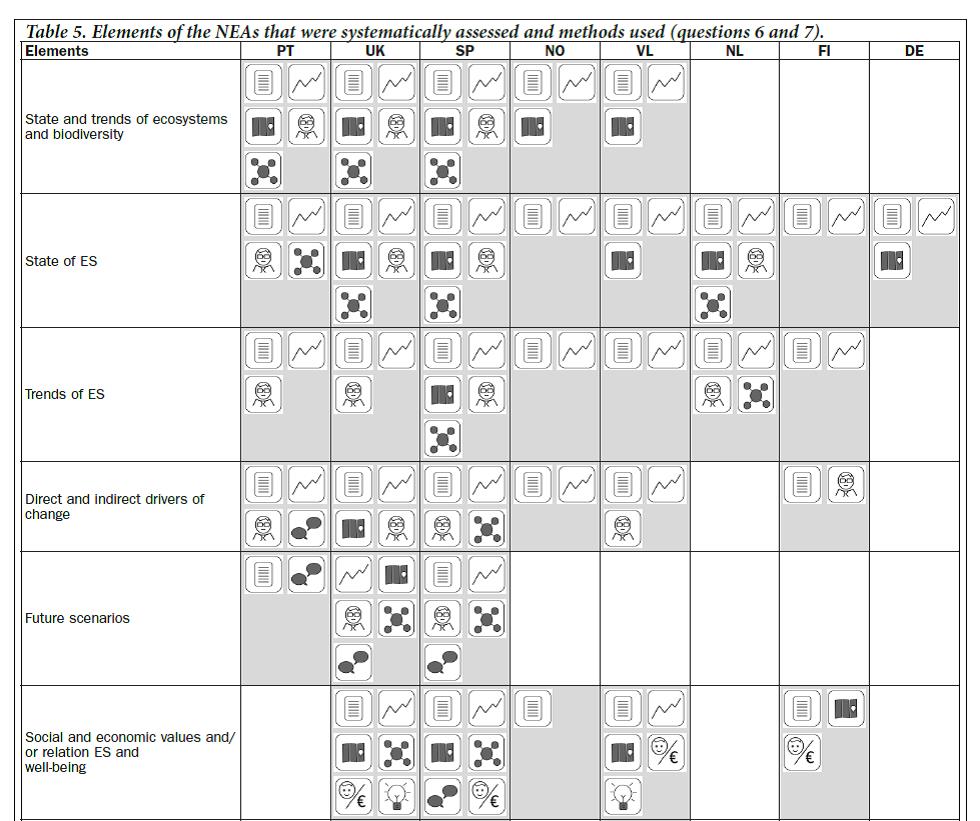

.jpg)